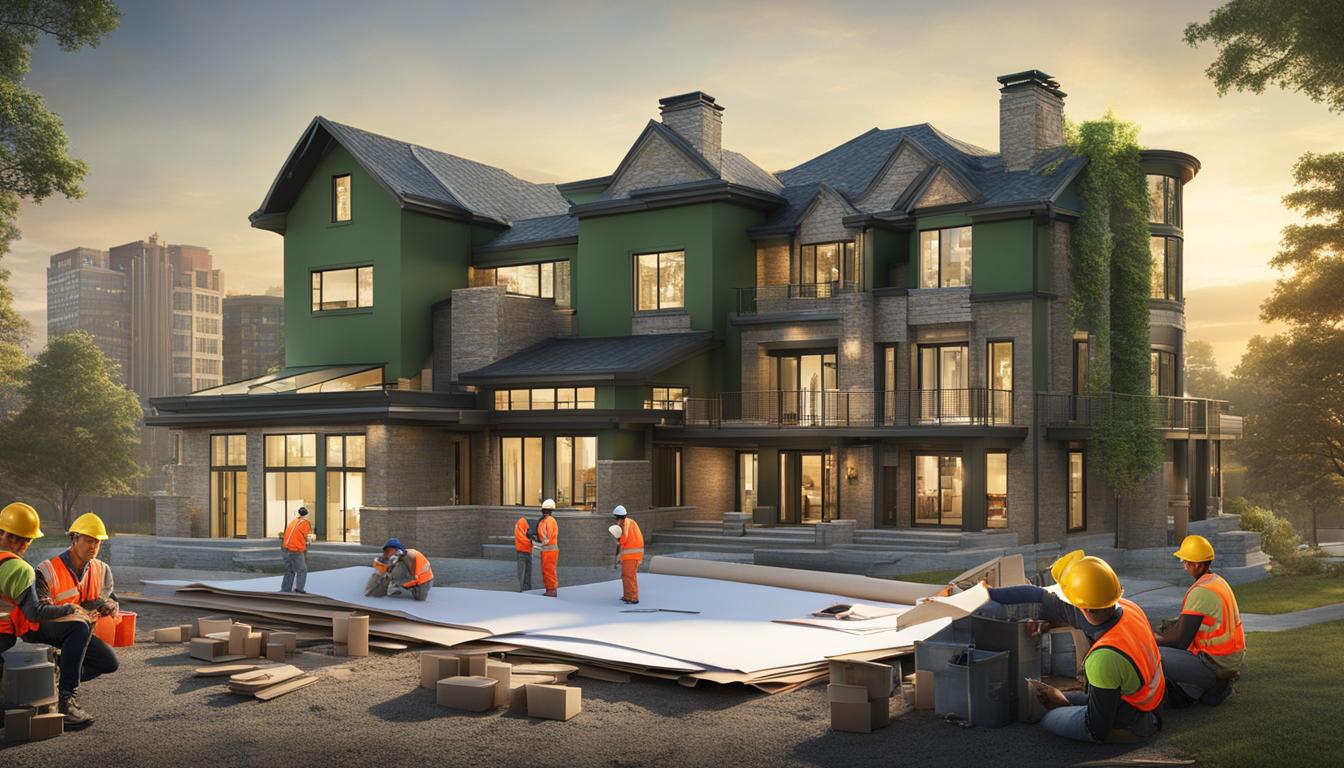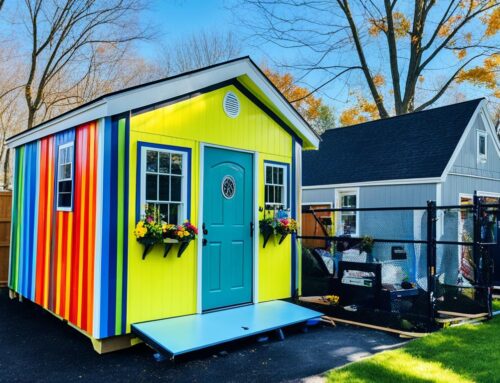Get building permits, variances, maps & COs quickly on Long Island! Call 631-492-0927 for fast service at TracisPermits.com.
The Building Department, located on the second floor of Village Hall, is responsible for reviewing and approving all residential and commercial property actions in Garden City. This includes new buildings, additions, alterations, accessory structures, signs, and more. The department also handles plan review, inspections, and the issuance of permits and certificates of occupancy. It is important for property owners to ensure that the necessary permits and approvals are obtained, even if contractors handle the filing process.
Key Takeaways:
- Obtain building permits, variances, radius maps, and certificates of occupancy from the Garden City Building Department.
- The Building Department reviews and approves residential and commercial property actions.
- Ensure necessary permits are obtained for new buildings, alterations, and accessory structures.
- Plan reviews, inspections, and certificates of occupancy are handled by the Building Department.
- Property owners are responsible for compliance with local building codes and zoning laws.
When Do I Need to Apply for a Building Permit?
To ensure compliance with local zoning laws and building codes, it is important to understand when a building permit is required. The “When Do I Need to Apply for a Building Permit?” brochure provided by the Building Department in Garden City offers guidance on this matter. While specific projects may vary, the general rule is that any construction, alteration, or addition that affects the safety, structural integrity, use, or occupancy of a building requires a permit.
Property owners are responsible for determining whether their project falls under the permit application process. By doing so, they can avoid potential legal issues and ensure that their construction plans meet the necessary regulations. Applying for a building permit demonstrates a commitment to safety and adherence to building codes, ultimately protecting the value and integrity of the property.
When reviewing the brochure, keep in mind that even seemingly minor modifications, such as installing a new window or removing a load-bearing wall, may still require a permit. It is always best to consult with the Building Department to avoid any potential violations or penalties. By following the proper procedures and obtaining the necessary permits, property owners can ensure a smooth construction process and avoid future complications.
| Project Type | Permit Required |
|---|---|
| Constructing a new building or structure | Yes |
| Adding an addition to an existing structure | Yes |
| Installing or modifying electrical wiring | Yes |
| Installing or modifying plumbing systems | Yes |
| Changing the use of a building | Yes |
| Removing load-bearing walls | Yes |
| Installing new windows or doors | Yes |
| Constructing a fence or retaining wall | Varies depending on height and location |
| Constructing a shed or accessory structure | Varies depending on size and location |
Types of Permits and Applications
The Building Department in Garden City handles a variety of permit applications to ensure the safe and compliant development of properties. These permits are categorized based on the type of project and the nature of the property.
Residential Building Permits
For residential projects, property owners must submit a residential building permit application. This includes any construction, alteration, or addition to a residential property. Whether it’s building a new home or making renovations to an existing one, obtaining a residential building permit is essential to ensure that the project meets all necessary codes and regulations.
Non-Residential Building Permits
Non-residential projects, such as commercial or industrial buildings, require a non-residential building permit application. This encompasses construction, alterations, or additions to properties that are not primarily used for residential purposes. From retail spaces to office buildings, obtaining the appropriate non-residential building permit is crucial for compliance and safety.
Temporary Structure Permits
Temporary structures, such as tents, trailers, or portable toilets, also require permits. These permits ensure that temporary structures are erected safely and meet the necessary standards. Whether it’s for a special event or a construction site, obtaining a temporary structure permit is necessary to ensure that temporary structures do not pose any risks to individuals or the surrounding environment.
Certificate of Occupancy
A certificate of occupancy is required for new businesses or for any changes in occupancy type. This certificate verifies that the property meets all applicable building codes and regulations and is suitable for its intended use. It is important for property owners to obtain a certificate of occupancy to demonstrate compliance with the law and to provide potential occupants or buyers with confidence in the property.
| Permit Type | Description |
|---|---|
| Residential Building Permits | For residential projects, including construction, alterations, or additions to residential properties. |
| Non-Residential Building Permits | For commercial or industrial projects, including construction, alterations, or additions to non-residential properties. |
| Temporary Structure Permits | For temporary structures such as tents, trailers, or portable toilets. |
| Certificate of Occupancy | Required for new businesses or changes in occupancy type to verify compliance with building codes. |
The Importance of Permits and Inspections
Obtaining the necessary permits and undergoing inspections is crucial for ensuring compliance with construction regulations and maintaining the safety, value, and legal status of a property. The Planning Department and the Building Department work collaboratively to enforce site development and land use regulations, ensuring that all construction projects meet the required standards.
Construction regulations exist to protect the community’s welfare, preserve the environment, and promote sustainable development. By obtaining the necessary permits, property owners demonstrate their commitment to adhering to these regulations and contributing to responsible growth.
Permits and inspections serve several important purposes. First, they ensure that construction projects are carried out in accordance with approved plans and specifications, minimizing the risk of structural failures, hazards, or other detrimental impacts on the property or neighboring properties. The inspections conducted by qualified professionals help identify and address potential issues, ensuring that the construction process is executed correctly from start to finish.
In addition to promoting safety, permits and inspections also provide a documentation trail for potential legal or insurance purposes. Having the proper permits and inspections in place can help protect property owners from liability claims and ensure that property insurance covers any damages caused by construction activity. It also facilitates the smooth sale or transfer of the property, as potential buyers can have confidence in the compliance and quality of the construction work.
The Role of Inspections in the Construction Process
Inspections are a critical part of the construction process. They typically occur at various stages, including foundation, framing, electrical, plumbing, and final inspections. Each inspection is conducted to verify that the work has been completed in compliance with applicable building codes, zoning laws, and approved plans.
Benefits of Permits and Inspections
The benefits of obtaining permits and undergoing inspections extend beyond legal compliance. They include:
- Ensuring compliance with construction regulations and building codes
- Protecting the structural integrity of the property
- Minimizing potential hazards and risks
- Providing a record of compliance for legal and insurance purposes
- Enhancing the property’s value and marketability
Overall, obtaining the necessary permits and undergoing inspections is essential for responsible construction practices and the long-term success of any construction project. By working in partnership with the Planning Department, property owners can ensure that their projects meet the required standards, comply with regulations, and contribute positively to the community’s development.
Conclusion
The Garden City Building Department plays a crucial role in the property development process. It is responsible for reviewing and approving building permits, variances, radius maps, and certificates of occupancy. Property owners must understand the importance of obtaining the necessary permits, following zoning laws and building codes, and undergoing inspections to ensure the safety, compliance, and value of their properties.
To get building permits, variances, maps, and certificates of occupancy quickly on Long Island, contact the Building Department at TracisPermits.com or call 631-492-0927. Our team is dedicated to providing fast and efficient service. Whether you’re planning a residential or non-residential project, we have the expertise to guide you through the process. Don’t risk unnecessary delays or compliance issues – rely on our experienced professionals to help you every step of the way.
At TracisPermits.com, we understand the complex regulations and requirements involved in property development. Our goal is to make the permit application process as smooth and streamlined as possible. With our assistance, you can navigate the intricacies of building permits, variances, radius maps, and certificates of occupancy with confidence. Trust in our expertise and let us handle the paperwork and coordination, so you can focus on bringing your project to life.
Don’t hesitate to reach out to us at TracisPermits.com or call 631-492-0927 for more information and assistance. We’re here to support you in your property development endeavors and ensure that you have the necessary permits and approvals to realize your vision. Let us help you achieve compliance, safety, and value in your Garden City property.
FAQ
When do I need to apply for a building permit?
You need to apply for a building permit when any construction, alteration, or addition affects the safety, structural integrity, use, or occupancy of a building.
What types of permits and applications are available?
The Building Department handles residential building permit applications, non-residential building permit applications, permits for temporary structures, and certificates of occupancy for new businesses or changes in occupancy type.
Why is it important to obtain permits and undergo inspections?
Obtaining permits and undergoing inspections helps protect the value of your property, ensures compliance with local codes, saves money on insurance, facilitates property sales, and promotes safety by meeting minimum standards.












